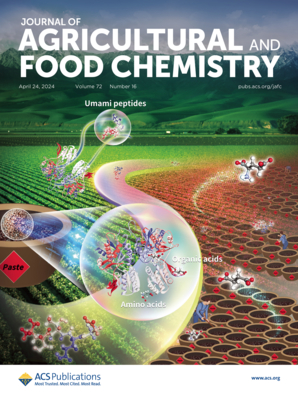枸杞枸杞亚精胺L通过靶向uc.141A促进抗生素诱导大鼠肠道修复
IF 6.2
1区 农林科学
Q1 AGRICULTURE, MULTIDISCIPLINARY
引用次数: 0
摘要
口服抗生素在治疗感染时损害肠道上皮。枸杞源自枸杞,是一种具有促进肠道健康作用的膳食和滋补草药。其中的亚精胺化合物枸杞亚精胺L (LBS L)能促进肠道上皮的生长。本研究的目的是研究LBS L对抗生素刺激的肠道上皮损伤的修复作用,以及与T-UCR相关的过程。用抗生素刺激肠上皮细胞诱导损伤。通过细胞分析评估LBS - L和t - ucr相关机制的影响。最后,通过给药建立了大鼠肠道损伤模型。我们发现LBS L通过调节uc.141A/miR195-3p逆转抗生素引起的肠道损伤。在大鼠模型中观察到肠道损伤的减少。综上所述,LBS L通过调节uc.141A来改善抗生素诱导的大鼠肠上皮细胞损伤。本文章由计算机程序翻译,如有差异,请以英文原文为准。
Lycibarbarspermidine L from Goji Berry Promotes Intestinal Restoration in an Antibiotic-Induced Rat Model through Targeting uc.141A.
Oral antibiotics damage gut epithelium while treating infections. Goji berry derives from Lycium barbarum L., which is employed as a dietary and tonic herb with the effect of promoting intestinal health. The spermidine compound lycibarbarspermidine L (LBS L) in it can promote intestinal epithelial growth. The purpose of the research is to examine the reparative effects of LBS L against antibiotic-stimulated gut epithelial damage, as well as the processes associated with T-UCR. Intestinal epithelial cells were stimulated with antibiotics to induce injury. The impact of LBS L and T-UCR-related mechanisms was evaluated through cell assays. Ultimately, a rat model of intestinal injury was developed by administering antibiotics. We found that LBS L reversed the intestinal damage caused by antibiotics through modulating uc.141A/miR195-3p. A reduction in intestinal damage was observed in rat models. In conclusion, LBS L ameliorates antibiotic-induced intestinal epithelial cell damage in rats by modulating uc.141A.
求助全文
通过发布文献求助,成功后即可免费获取论文全文。
去求助
来源期刊
CiteScore
9.90
自引率
8.20%
发文量
1375
审稿时长
2.3 months
期刊介绍:
The Journal of Agricultural and Food Chemistry publishes high-quality, cutting edge original research representing complete studies and research advances dealing with the chemistry and biochemistry of agriculture and food. The Journal also encourages papers with chemistry and/or biochemistry as a major component combined with biological/sensory/nutritional/toxicological evaluation related to agriculture and/or food.

 求助内容:
求助内容: 应助结果提醒方式:
应助结果提醒方式:


